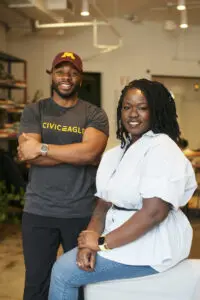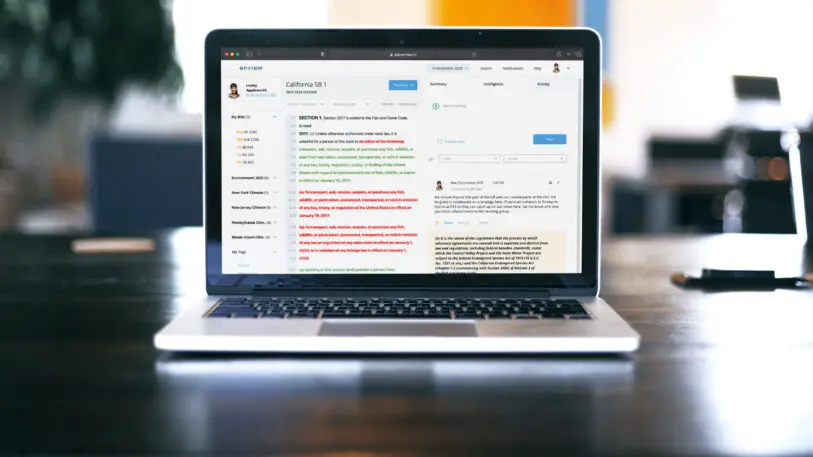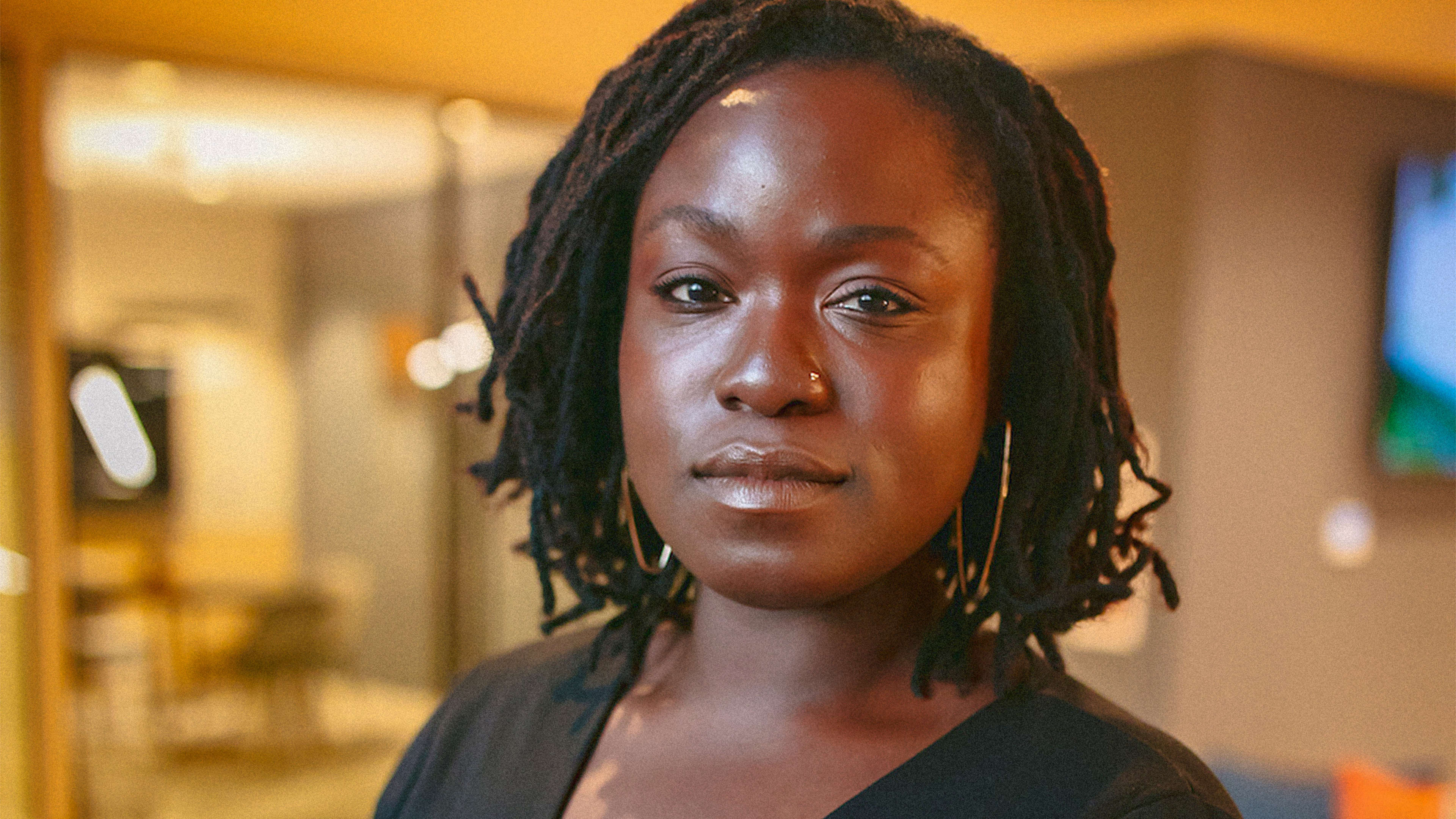Yemi Adewunmi is co-founder and chief product officer at Civic Eagle. She spoke to Doreen Lorenzo for Designing Women, a series of interviews with brilliant women in the design industry.
Doreen Lorenzo: How did you first get interested in design?
Yemi Adewunmi: I actually didn’t realize I was interested in design until my mid-20s. When I was younger I was really into problem-solving, which I now recognize as the foundation of design-thinking. I originally aspired to become a lawyer and I went to college for political science with a prelaw focus. During college, I realized I didn’t necessarily want to be a lawyer, but I was really interested in policy, so I started my career as a policy researcher and analyst for the New York State Legislature, and then pursued a master’s in public administration.

DL: What inspired you to enter the product design space and launch your company, Civic Eagle?
YA: When we started in 2015, we wanted to build a mobile app that connected people to information about politics and policy. I met my business partner, Damola Ogundipe, in undergrad and we later reconnected because he had an idea of using tech to help people understand how specific policies were affecting them, like the Affordable Care Act (ACA) for example. He was working in healthcare IT at the time and found it frustrating that you couldn’t figure out in plain language what the ACA did. That expanded into a larger concept of allowing people to easily communicate their viewpoint on policy in a seamless way, like through a mobile app in their pocket. He reached out to his network to figure out who could help him create this app, and that team included me, who was working in policy at the time, and our co-founder, Shawntera Hardy. We developed and launched our app, and received a lot of encouragement from people who believed in our vision, but they weren’t necessarily active users on our app. So we went back to the drawing board and approached it from a design-thinking lens, starting at defining the problem we were solving and who we were solving it for, and how we could make a business model of it. By 2018, we had pivoted our product from what was a B2C mobile app, into Eview by Civic Eagle, a B2B software solution for policy professionals. We discovered that even people who were policy experts were not using innovative tools to do their work, so we wanted to give these policy professionals the most user-friendly, modern, future-of-work style solution that would allow them to be more effective in monitoring, reporting, and collaborating on policy work.

YA: Our users are advocates in nonprofits, lobbyists, and folks who work within a company’s government affairs team. Essential parts of their policy work include monitoring proposed laws as they are revised in the legislative process, communicating relevant updates to their organization, and working with others to strategize and influence policy. Many of our customers are doing this work across multiple states and normally they’d have to scour each state website to find this information because at the state level, this information is decentralized. Civic Eagle has built a solution that centralizes all of that legislative data. For example, our customer Fair Fight, which is a national voting rights organization, uses our platform for research and to track legislation related to voting rights across several states. Through our platform users can easily monitor, report, and collaborate on policy. They can search for legislation across multiple states at one time; they can follow a bill and receive alerts whenever that piece of legislation changes; and what’s really cool is that they can markup a bill directly within our platform. Think of it as centralizing all of your notes, emails, and PDFs into one place so you know exactly what you’re working on at any given moment, and can easily collaborate with your team. The policy-making process is a large ecosystem with a lot of moving pieces and stakeholders involved. Our goal is to remove a lot of the friction and make policy collaboration as effective as possible. Different organizations can also find one another on our platform and work on policy together. When laws are designed, it impacts the bottom line of an organization or a community and we want to help people gain more access to this information.
DL: From the COVID-19 response to the Black Lives Matter Movement’s calls for racial justice and reform, how did Enview make legislation and policy more accessible in 2020?
YA: Our first reaction to COVID-19 was to check in with our customers and see what was top of mind for them. For most of our customers, there was uncertainty around the status of the legislation they had been working on and how COVID was going to impact the progress of their work. Because our system aggregates all the state legislation across the country, it was a perfect tool for us to be able to put in keywords like “coronavirus” or “stimulus” and build lists of new legislation that was popping up across the country. Typically you’d have to be a customer to have access to the list of bills, but we knew it was really useful information so we opened up access to our list of bills related to the coronavirus. Our list included every new bill introduced in a state legislature in response to the pandemic. After the calls for racial justice and police reform started over the summer, we created another list of criminal justice reform legislation across the country. Our goal was to make sure that information was accessible to anyone who was looking for it. We’ll do what we can to surface relevant policy information that’ll help not only our customers, but our community at large because giving more people access to information is not only good for public policy, but also good for our business.
DL: How did people react when you pitched this whole new idea? Did you get an investor right away?
YA: The first time we pitched our new business model, we got accepted into a Google For Startups program focused on Black founders. The program gave us a week of mentorship and workshops to enhance our businesses and then culminated in a pitch competition in front of a panel of investor judges. Although we didn’t win the first prize, afterwards one of the judges, Arlan Hamilton, reached out to our company, told us that she believed in us and ended up writing us our first check for $25,000. We used that opportunity, that first piece of validation, to apply to our first accelerator program, which was focused on civic technology companies. That gave us even more of a footing into building the company. The following year we were accepted into Techstars accelerator, which was an incredible experience for us and helped us raise our first priced round of venture capital. The initial barrier was getting that first check, gaining your first believer. After that, it gave us more ability and flexibility to explore our idea more.
DL: Do you think governments would be open to using more design thinking strategies to help them develop more successful civic strategies?
YA: Government is the perfect place for design-thinking strategies to be used. Governments are meant to be human-centric; that is the point of public service. I believe that there are a lot of opportunities to solve big problems across the public sector by approaching them with a fresh lens, which the design-thinking process encourages. It would require really embracing the empathy, ideation, experimentation stages of the process. And it would require a lot of investment in training and transforming familiar systems, which is tough. But the good thing is that governments already have some experience with structuring task forces and cross-agency working groups, which is a step in the direction of collaborative problem solving. It’d be great to see more investment and effort in ensuring that more voices are heard in the design of policy and civic solutions.
DL: Designers mostly get into the design world because they want to do good. What advice would you give them on how to make social impact?
YA: I believe that design can be applied anywhere and in every context, and in that way I think the world is our oyster, as designers. We really have the choice to decide where we want our work to leave an impact. There are so many transferable communications skills that designers have because it’s not just about our creative talent— it’s about the way we think about human behavior and psychology, the way we observe trends and our ability to project the future. Designers are very special people. We have this intuition about what looks and sounds good. Bringing that intuition to any context that needs a positive shift is where we can have the most impact, whether that’s getting a job with an organization with a great mission, or volunteering your skills on the weekend to a cause that you support.
Recognize your brand’s excellence by applying to this year’s Brands That Matter Awards before the early-rate deadline, May 3.
